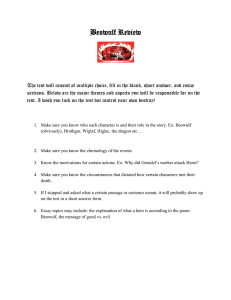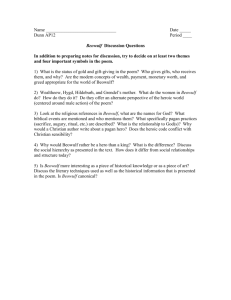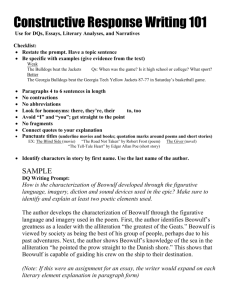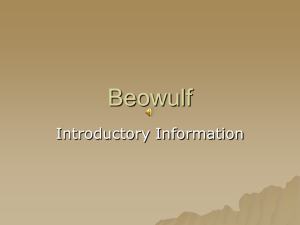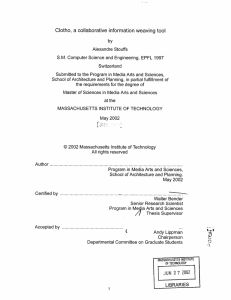BeoWulf
advertisement
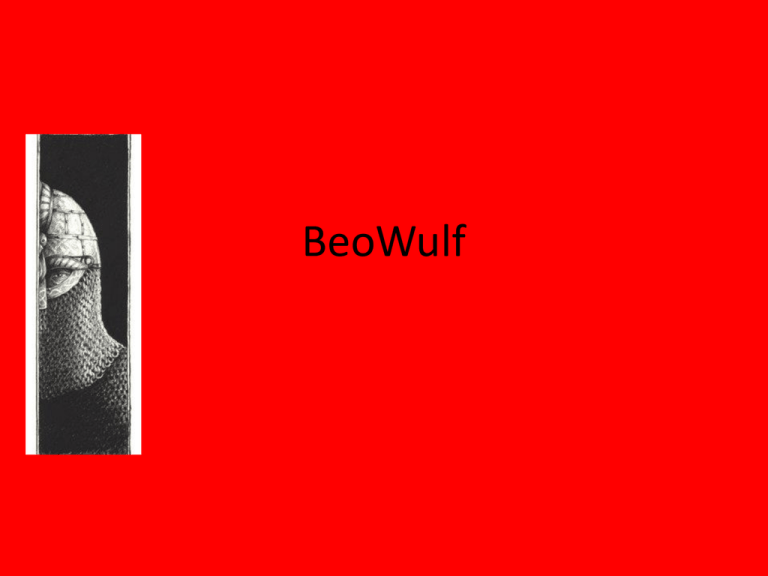
BeoWulf When? Where? Who? • We may say that Beowulf was composed somewhere in England between about 521 AD and1026 AD • We do not know for sure where in England the poem was composed. • Nor do we know if the poem was composed by a single author, or whether it is the result of the merging together of ballads by different authors, nor whether the poem was significantly altered subsequent to its first written form. Why? • The poem's purpose is also unclear arguments have been made for a naturalistic mythic allegory, a Christian allegory, a criticism of heroic culture, a mourning for the loss of heroic culture, a Germanic 'Old Testament', an allegory concerning contemporary politics in one or other of the Saxon kingdoms - just to mention a few. Fate vs. Free Will • Over the whole poem broods the thought of Wyrd – the three sisters of fate. Gruesome and bloodthirsty. CLOTHO AND LACHESIS AND ATROPOS • THERE WERE MEN FIGHTING IN WAR LIKE HARNESSES…AND BEHND THEM THE DUSKY FATES, GNASHING THEIR WHITE FANGS, GLOWERING. GRIM, BLOODY AND UNAPPROACHABLE, STRUGGLED FOR THOSE WHO WERE FALLING. From Hesiod • FOR THEY ALL WERE LONGING TO DRINK DARK BLOOD. SO SOON AS THEY CAUGHT A MAN OVERTHROWN OR FALLING NEWLY WOUNDED, ONE OF THEM WOULD CLASP HER GREAT CLAWS ABOUT HIM. AND HIS SOUL WOULD GO DOWN TO HADES. • AND WHEN THEY HAD SATISFIED THEIR SOULS WITH HUMAN BLOOD, THEY WOULD CAST THAT ONE BEHIND THEM, AND RUSH BACK INTO THE TUMULT AND FRAY. • CLOTHO AND LACHESIS WERE OVER THEM AND ATROPOS LESS TALL THAN THEY, A GODDESSS OF NO GREAT FRAME, YET SUPERIOR TO THE OTHERS AND THE ELDEST OF THEM…AND THEY ALL MADE A FIERCE FIGHT OVER ONE POOR WRETCH, GLARING EVILY AT ONE OTHER WITH FURIOUS EYES AND FIGHTING EQUALLY WITH CLAWS AND HANDS. • The atmosphere is grey and misty like the marsh home of Grendel. • The grey gloom is a reflection of the mood these folk had on life. • Tragedy was always near. Yet…. • Fate must be fought against, whatever the odds. Brave before all else is this Beowulf, with the bravery of a young, strong, unsoftened people, the physical courage which not only meets an enemy unshrinkingly, but seeks him out to fight with him alone and weaponless. • This is the very rapture and madness of bravery, the apotheosis of daring. • The love of praise and the desire for glory breathing through every utterance in the poem, are not the evidence of a vaulting ambition which seeks its goal through crooked ways, but rather the unrestrained outbreak of the longing for appreciated activity and power. • Beowulf does not seek to conceal his desire for praise. • He boasts of his exploits with a child's simplicity of enjoyment. His age is too far from civilization to have attained the virtue of modesty and the vice of hypocrisy. Grendel Came from Cain and Abel Loyalty is Everything • The spirit of loyalty that has already grown, in Beowulf's time, into a racial institution, is strongly impressed upon the poem. • The duty of the thegn to his lord, a service resting upon sentiment as well as upon necessity, is performed heartily. • Woman is seen in various relations, occupying always a position of dignity, and inspiring those feelings of respect, that sense of her inviolability, which is the great honor of the Teutonic race; but the tenderer feeling that nourished feudalism into chivalry is quite beyond the pale of Beowulf's experience. Christian or Pagan? • In spite of the interpolations by a later Christian editor, the poem is pagan and of the essence of paganism. • The old fragment touching the Passing of Scyld hints at the mystery of birth and death; but aside from this there is no looking beyond that after-mystery, no dwelling upon the possibilities of the hereafter. • The whole work is an embodiment of the idea of practicality. • Beowulf died, not to establish a principle, but to secure the golden hoard of the fire-drake, and therefore the funeral dirge of this hero knells him out of the memory of men. • The history of Beowulf is the pathos of paganism and of the material. The text itself… • Alliteration! • Kenning: this is from the Old Norse verb “kenna” which means to know or recognize. It is a device for introducing descriptive color or for suggesting associations without distracting attention from the essential statement. • Basically, a kenning is a compact metaphor. • In its more complex form it is a riddle. Google – Beowulf text • • • • www.humanities.mcmaster.ca/beowulf Everypoet.com Etext.virginia.edu Sparknotes - but the TEXT not the summaries. • We have 20 books – so 11 computer savvy people should volunteer to read it on line. Literature Groups • • • • • • • • #1 John, Kerry, Gage, Brittany #2 Amanda S., Samantha, Ilana, Connor #3 Zain, Anna, Sharon, Jenna #4 Emily, Alicia, Jooneil, Amanda A. #5 Leahra, Scott, Reagan, Cindi #6 David, Jasmine, Natasha, Bobbi #7 Caitlin, Tyler, Kayla, Arriya #8 Jennifer, Ali, Josh, Jamal

